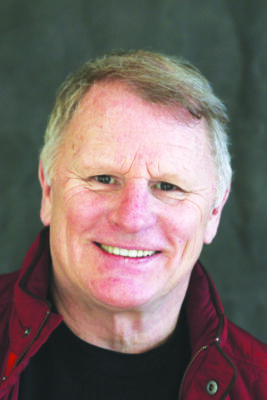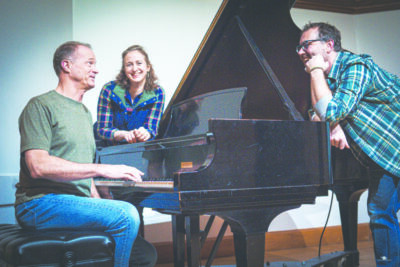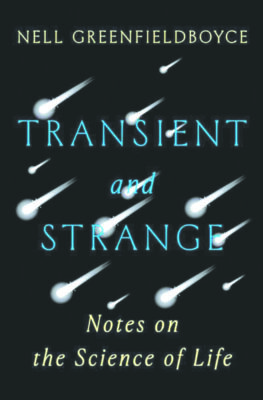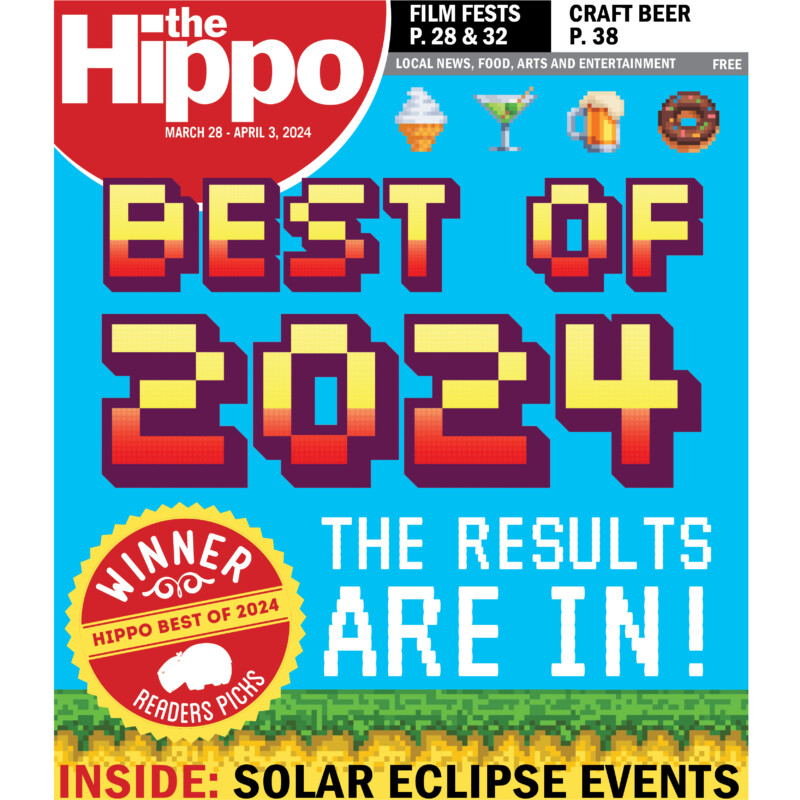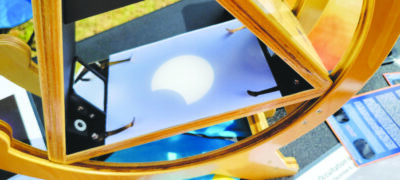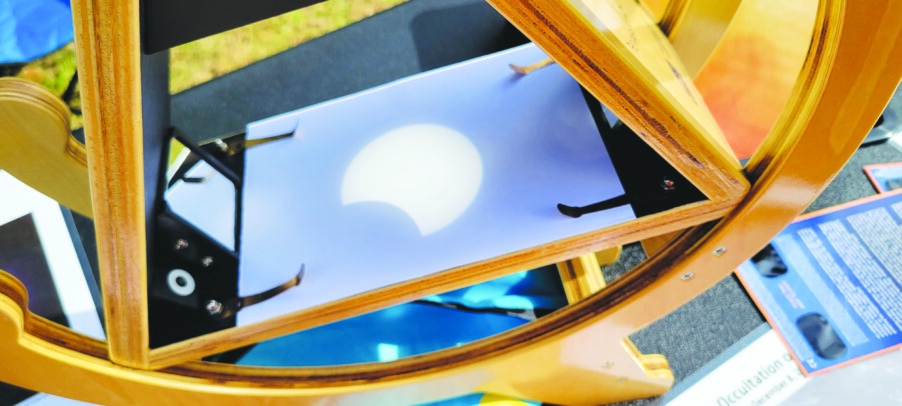Every now and then it comes around
By Zachary Lewis
[email protected]
Unless you have been living on the far side of the moon, you are aware that a total solar eclipse on April 8 will be visible across a slice of the country from Texas to Maine including New Hampshire.
The McAuliffe-Shepard Discovery Center in Concord is ready. Amanda Leith, an education coordinator at the Discovery Center, spoke about plans for the event.
“On the day of the eclipse we are going to be open from 12 to 5 p.m., prime time for eclipse viewing in the afternoon,” Leith said. “We’ll be doing some cyanotype sunprints, which is just light-reactive paper, UV-reactive paper using sunscreens … so people can make … designs and things like that and lay them out in the sun to see how those different SPFs protect the paper from the UV sensitivity.”
“We’re also making pinhole projectors,” Leith said. “We’re going to have some telescopes and other ways to view the solar eclipse on our lawn as well. We are waiting on a large-scale floor mat that shows the different layers of the sun and we have a floor puzzle of the moon … a 9-foot-wide puzzle so when you build the puzzle on top of the sun it will create what a solar eclipse would look like and you’ll see the corona around the outside with the Moon right in the middle, and an accessible version on the table as well for people that can’t get on the floor.”
The New Hampshire Astronomical Society will bring telescopes and help out with the festivities.
If the weather is less than favorable, the Discovery Center has a contingency plan. “All the activities will be the same, except for the sun prints — we need the sun for that, unfortunately,” Leith said. There will be “planetarium shows focused on the eclipse and ways that you can view it. It should still be a fun day regardless.”
The solar eclipse itself “will start at about 2:30 p.m. in the afternoon here in Concord,” Leith said. “That will be what we call first contact…. Then, the maximum for here in Concord will be about 3:30 p.m. in the afternoon. Fourth contact, or the end of the eclipse, will be at about 4:45 p.m. So it will be over the course of about 2 and a half hours and we’ll get to see varying levels of the moon covering the sun.”
The amount of eclipse you experience depends on where you are in the state.
“Everywhere in New Hampshire will at least experience 94 percent,” Leith said. There will be 96 percent totality at the Discovery Center. “It won’t go completely black. We’re not going to be able to see the stars in the middle of the day, unfortunately, but it should get darker as if we are heading into the evening hours.”
“North of Lancaster,” Leith said, “you are going to see totality. A total eclipse. No matter how you view an eclipse, whether it’s a partial solar eclipse or a total, they are all really special. This is the most coverage of the sun that we are going to get here in the state no matter where you are until 2079.”
What exactly is a solar eclipse? “A solar eclipse happens when the moon passes between the Earth and the sun,” Leith said. “The physics and orbital mechanics of our solar system makes this a very unique event for us on Earth. But when it [the moon] is at its closest point to the Earth, that’s when it does cover the entire surface and we can see that total solar eclipse, so that’s why we are getting one in April.”
Kelly Thompson, a visitor experience coordinator at the Discovery Center, is watching solar eclipse glasses fly off the shelves. “We keep kind of continuously selling out,” Thompson said. “I should be shipping them out until March 31. I’ll stop orders at that point. Those can be purchased over the phone for $3.50 a pair.” Glasses not being shipped can be purchased at the Discovery Center for $2.50.
Do not look at the eclipse without the glasses! Their special film is crucial in keeping your eyes protected from the sun, Leith explained. “The lenses of our eyes are very similarly shaped to magnifying glasses. I am sure many people as kids took magnifying glasses outside and tried to light things on fire and burned ant hills … the same thing would happen to the back of your eyes. It would damage your eyes irreparably.” The glasses do have an expiration date of around three years. “If anybody has them from 2017, definitely throw them away.”
NASA will be closely monitoring the event, Leith noted, because “the sun’s energy impacts our atmosphere in really unique ways, so they are actually sending up weather balloons all across the country.” NASA’s Nationwide Eclipse Ballooning Project includes a balloon in Pittsburg, New Hampshire, that will be sent up by teams from Plymouth State University.
The University of New Hampshire’s Space Weather Underground (SWUG) will be “deploying magnetometers to understand our atmosphere as well during the eclipse,” Leith said. “There are quite a few things happening here in our state.”
The solar eclipse is “a fun opportunity to connect with people,” Thompson said. “Gosh, we hope the weather is going to be great.”
Eclipse viewing party
McAuliffe-Shepard Discovery Center
2 Institute Dr., Concord, 271-7827, starhop.com
Eclipse glasses: $3.50 a pair to have glasses shipped (until March 31), $2.50 a pair in the Science Store
Eclipse day: Monday, April 8, open noon to 5 p.m., general admission ranges from $10 to $13, free for members and ages 2 and younger; discounts on memberships available on eclipse day
A partial totality of eclipse events!
- The New Hampshire Astronomical Society presents “What to Expect from a Solar Eclipse” on Wednesday, March 27, at 6:30 p.m. at Derry Public Library (64 E. Broadway, Derry, derrypl.org, 432-6140); register to attend at the library’s website. See nhastro.com.
- Plymouth State University professor and planetarium director Dr. Brad Moser will present “Lunch and Learn” on Tuesday, April 2, from noon to 1 p.m. at the Puritan Backroom (245 Daniel Webster Highway in Manchester). Tickets cost $15 per person, and includes a lunch buffet and a pair of solar eclipse viewing glasses. Get tickets at plymouth-usnh.nbsstore.net/lunch-and-learn-eclipse.
- The UNH Department of Physics and Astronomy welcomes the public to a free informal all-ages event, “The Science of Solar Eclipses,” on Wednesday, April 3, from 6 to 8 p.m. at the UNH Durham campus. See extension.unh.edu/eclipse for details and eclipse-related resources.
- The SEE Science Center (200 Bedford St. in Manchester) will host an eclipse viewing event at Arms Park in Manchester from 2 to 4:30 p.m. on Monday, April 8, with music from WZID and activities to explain eclipse science. Eclipse simulation videos online as well. SEE’s gift shop has eclipse glasses for $2 per pair with extended gift shop hours on Wednesday, April 3, and Thursday, April 4, from 10 a.m. to 7 p.m.; Friday, April 5, from 10 a.m. to 4 p.m.; and Monday, April 8, from 10 a.m. to 2 p.m. Visit see-sciencecenter.org.
- Interested in heading north for the festivities? Check out visitnh.gov/solareclipse for viewing tips, event listings, and lodging information.


